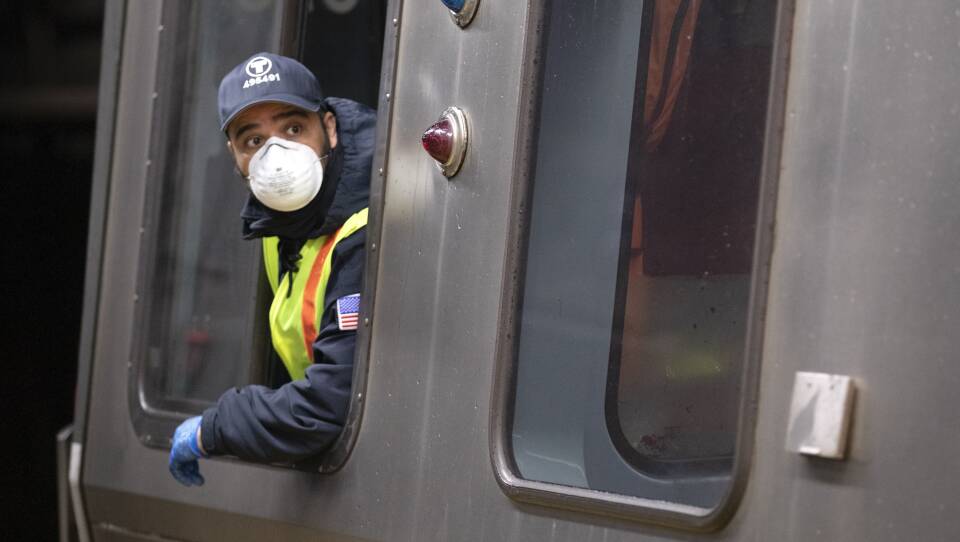At the same time that mask requirements are being dropped aboard public transit, in rideshares and in other public spaces across Massachusetts, COVID-19 cases are rising. It's a disconnect that's causing concern among local public health experts.
"We're seeing a lot of people, even people who have been somewhat cautious, people who have been vaccinated are being caught by the disease right now," said Leonard Marcus, co-director of the National Preparedness Leadership Initiative at the Harvard T.H. Chan School of Public Health.
"Put into that mix a very highly transmissible form of COVID, and we're finding that the numbers of cases are rising. The data that we're getting from the wastewater analysis — which have been quite accurate and good predictors of what's to come — those numbers are going up," Marcus said. "So this was the wrong time for us to lift the mask mandates on planes and on public transportation."
Wastewater levels and COVID-19 cases have risen significantly in recent weeks. COVID levels detected in wastewater have been increasing across the state — in Middlesex County, for instance, the levels are now 11 times higher than two months ago. The Boston Public Health Commission announced Thursday that there was a 65-percent increase in COVID cases over the last two weeks, and urged city residents to get tested, get vaccinated and wear a mask in indoor settings.
Marcus said case numbers now are likely an undercount.
"The case number data is somewhat skewed by the fact that most people, if they have a mild case of COVID, will at best take an antigen test, and many people aren't even doing that," Marcus said. "So we have to recognize that, though the case numbers are going up, we don't know how much they're going up because most of those cases aren't reported."
But he points to hospitalizations and deaths, which have not increased rapidly, as a good sign.
"So it could very well be that this BA.2 [variant of COVID] gets people sick but not sick enough to go to a hospital," he said.
Even so, there were 373 Massachusetts people hospitalized with COVID on Tuesday, up from the low 200s in March. More than 60 percent of the people now hospitalized were reported to be fully vaccinated when they contracted COVID.
"I'm a little nervous about what's going on in Massachusetts," said Dr. David Hamer, professor of global health and medicine at Boston University.
On top of the wastewater and new case data, Hamer points to new genetic sequencing that suggests new subvariants are beginning to emerge.
"And people are theorizing that they're more transmissible," Hamer said. "So all those combined with the desire to be together, to have meetings in person, to see friends. And then suddenly all the mask mandates for public transportation being literally thrown out the window, it's not the optimal combination of of factors."
Even though people may no longer required to wear a mask indoors and on public transportation, Hamer said it's still a good idea in crowded places with limited ventilation.
"I think people should wear a mask if they have any degree of concern about their own health, especially if they're older, they haven't been vaccinated at all or they haven't had a booster in a while or if they have underlying medical conditions that greatly increased risk," he said. "I think certain people just can't afford to become infected."
Massachusetts is fortunate to have a "robust wastewater tracking system," said Julia Raifman, an assistant professor at the Boston University School of Public Health who leads the COVID-19 U.S. State Policy Database.
"But it's also important to realize that this tracking is really most useful if we link it to action," she said. "If we just watch the curve go up and down, it doesn't benefit us much."
Raifman said Massachusetts should take an approach similar to Philadelphia's, where mitigation measures like mask policies are tied to increases in the data.
"I see a lot of room for improvement in Massachusetts, where we have had nearly 6,000 people die since last summer and where we continue to have a need to improve the vaccination rate, improve boosting and definitely improve equity in vaccination and boosting," Raifman said.
New research from Raifman and her colleagues at Boston University, which has not yet been published, found notable economic disparities in vaccination rates across Massachusetts.
"Unfortunately, we see that our lowest-income communities have been left behind on vaccination," Raifman said. "We also see that our lowest-income communities have been unprotected by mask policies during surges, which really speaks to the importance of state action, making sure that mask policies protect everyone when there are periods of high transmission."
A poll released Wednesday by the AP-NORC Center for Public Affairs Research says 56 percent of respondents strongly or somewhat favor requiring people to wear masks on planes, trains and other public transportation. Twenty-four percent were somewhat or strongly opposed.
"That's a really significant number, because there's been so much attention on people wanting to get rid of the masks," said Marcus, with Harvard's T.H. Chan school. "Those people are very, very loud. They're very, very outspoken. It's very political.
"The majority of people in this country would prefer to continue wearing masks," he went on. "I think that says a lot about the politics of COVID and whether we're doing things based on science and what the population really wants us to be doing, or we're being pulled away in a direction that could be very detrimental because of politics."








